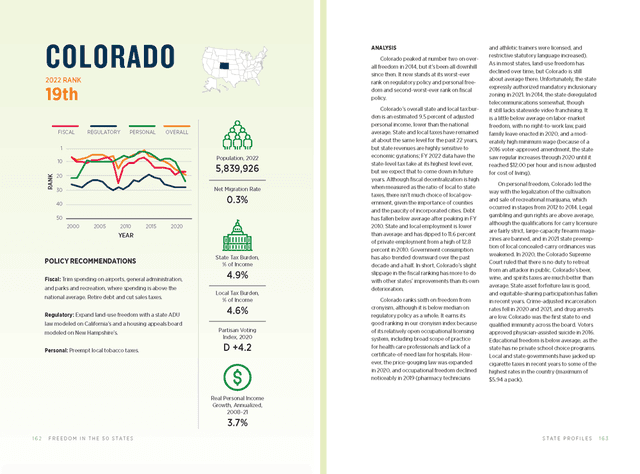Policy Recommendations
- Fiscal Trim spending on airports, general administration, and parks and recreation, where spending is above the national average. Retire debt and cut sales taxes.
- Regulatory Expand land-use freedom with a state ADU law modeled on California’s and a housing appeals board modeled on New Hampshire’s.
- Personal Preempt local tobacco taxes.
Analysis
Colorado peaked at number two on overall freedom in 2014, but it’s been all downhill since then. It now stands at its worst-ever rank on regulatory policy and personal freedom and second-worst-ever rank on fiscal policy.
Colorado’s overall state and local tax burden is an estimated 9.5 percent of adjusted personal income, lower than the national average. State and local taxes have remained at about the same level for the past 22 years, but state revenues are highly sensitive to economic gyrations; FY 2022 data have the state-level tax take at its highest level ever, but we expect that to come down in future years. Although fiscal decentralization is high when measured as the ratio of local to state taxes, there isn’t much choice of local government, given the importance of counties and the paucity of incorporated cities. Debt has fallen below average after peaking in FY 2010. State and local employment is lower than average and has dipped to 11.6 percent of private employment from a high of 12.8 percent in 2010. Government consumption has also trended downward over the past decade and a half. In short, Colorado’s slight slippage in the fiscal ranking has more to do with other states’ improvements than its own deterioration.
Colorado ranks sixth on freedom from cronyism, although it is below median on regulatory policy as a whole. It earns its good ranking in our cronyism index because of its relatively open occupational licensing system, including broad scope of practice for health care professionals and lack of a certificate-of-need law for hospitals. How-ever, the price-gouging law was expanded in 2020, and occupational freedom declined noticeably in 2019 (pharmacy technicians and athletic trainers were licensed, and restrictive statutory language increased). As in most states, land-use freedom has declined over time, but Colorado is still about average there. Unfortunately, the state expressly authorized mandatory inclusionary zoning in 2021. In 2014, the state deregulated telecommunications somewhat, though it still lacks statewide video franchising. It is a little below average on labor-market freedom, with no right-to-work law, paid family leave enacted in 2020, and a moderately high minimum wage (because of a 2016 voter-approved amendment, the state saw regular increases through 2020 until it reached $12.00 per hour and is now adjusted for cost of living).
On personal freedom, Colorado led the way with the legalization of the cultivation and sale of recreational marijuana, which occurred in stages from 2012 to 2014. Legal gambling and gun rights are above average, although the qualifications for carry licensure are fairly strict, large-capacity firearm magazines are banned, and in 2021 state preemption of local concealed-carry ordinances was weakened. In 2020, the Colorado Supreme Court ruled that there is no duty to retreat from an attacker in public. Colorado’s beer, wine, and spirits taxes are much better than average. State asset forfeiture law is good, and equitable-sharing participation has fallen in recent years. Crime-adjusted incarceration rates fell in 2020 and 2021, and drug arrests are low. Colorado was the first state to end qualified immunity across the board. Voters approved physician-assisted suicide in 2016. Educational freedom is below average, as the state has no private school choice programs. Local and state governments have jacked up cigarette taxes in recent years to some of the highest rates in the country (maximum of $5.94 a pack).

